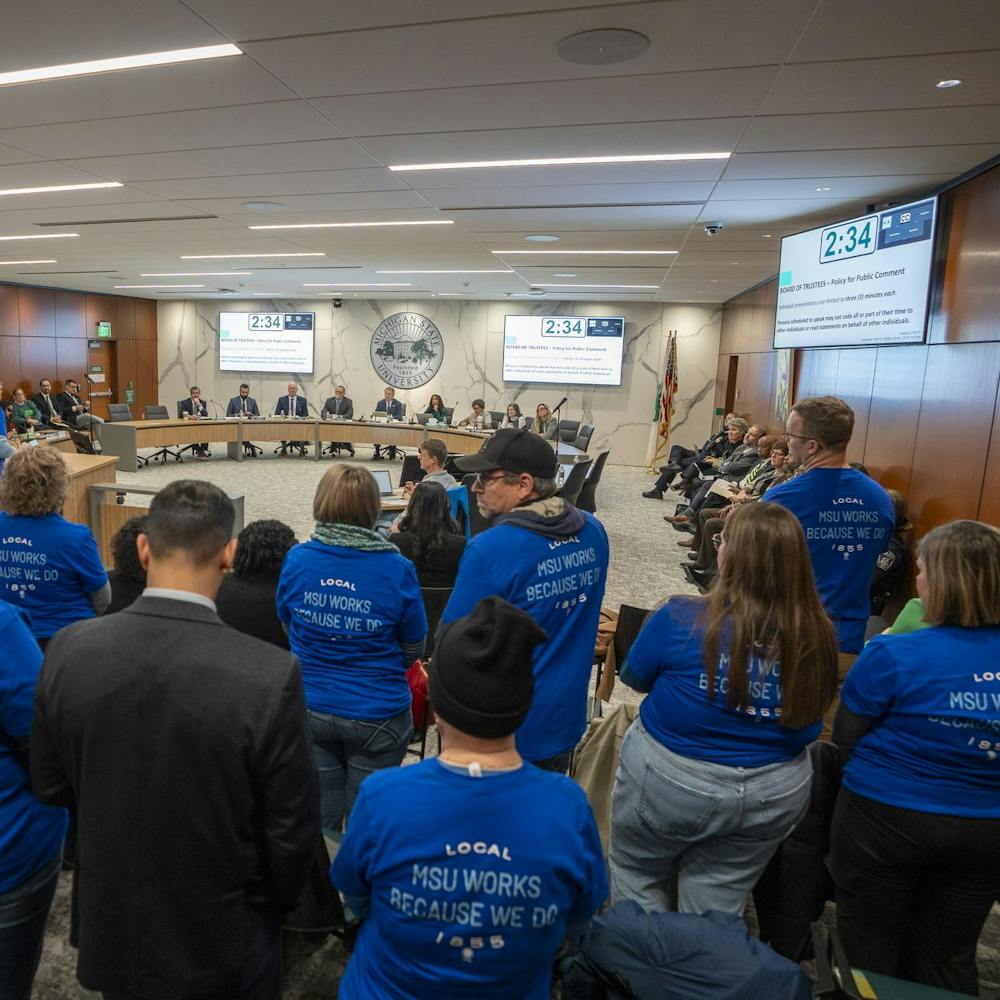Content warning: This story will intricately discuss my experience with sexual violence and reporting it to Michigan State University. Segments of my story will be explicit and may trigger trauma-related responses.
When I was sexually assaulted, Michigan State University was again in the middle of a leadership change resulting from the mishandling of sexual misconduct.
My career, education and life revolve around being a journalist. I’m an objective storyteller who provides the content for others to form their opinions while constructing the illusion of the absence of my own.
I don’t share my opinions on political matters. I don’t show up to protest when the university dishonors survivors.
But at a certain point, silence becomes dangerous, and I refuse to contribute to the problem in this way.
Every morning, I go straight to the newsroom. Here, in my professional life, the discourse surrounds MSU’s latest Title IX crisis, which would go on to end Samuel L. Stanley Jr.’s presidency. I walk reporters through the details of it with as much strength as I can muster.
When I’m home, alone with my thoughts, everything bubbles to the surface. I struggle to come to terms with this horrible violation of my body and trust as a survivor of sexual assault. I attempt to place myself in the picture of misconduct that has plagued MSU for decades.
I made the decision to make a report to MSU’s Office of Institutional Equity two days after the assault. There wasn’t so much as a second thought – I viewed reporting as the obvious next step. It’s been drilled into me that this is what you do. MSU states over and over again that it stands with survivors, that it wants you to report. Administration boasts that MSU is improving in this area every minute of every day.
My best friend was assaulted during our freshman year. I urged her to make a report because, duh – it’s what you’re supposed to do! She didn’t. At the time, I couldn’t understand why she didn’t want to take action.
But now I get it.
After my experience, I’d struggle to encourage someone to report, as I once encouraged my friend. It’s time-consuming, it’s burdensome and it just plain hurts.
But here’s the sad truth: Nothing is going to improve without our time and our pain. MSU leadership knows this and publicly admits it.
Survivors are the only ones who understand just how much work MSU has left to do. The administration, the Board of Trustees, the auditors — none of them can see it like we do.
Within weeks after I was assaulted, Interim President Teresa Woodruff wrote a column for the Lansing State Journal on the topic of Title IX at MSU. The essay was in response to a USA Today study that showed MSU received more RVSM-related reports from 2014-2020 than any other surveyed school.
On MSU’s relationship violence and sexual misconduct “journey,” Woodruff said in the article, “Have we gotten it right for everyone? No. Are we educatable by our journey? Do we demand of ourselves accountability and continuous improvement? Yes; and yes again.”
I read, and it suddenly all becomes clear: MSU’s plan is to learn from the countless survivors they have failed and then celebrate the progress. Keep failing. But keep learning and celebrating.
Will I be one of the survivors who is failed?

Woodruff said the amount of reports MSU receives is sobering and shows it's on the right track. But initiating an investigation is simply the first piece of the puzzle. MSU clearly doesn’t see the whole picture, just the numbers and the end result.
I went to the Center for Survivors two days after I was assaulted. I was horrified to discover that it’s housed roughly five footsteps across the room from MSU’s financial aid office. Rows of chairs serving as a waiting room rest between the two doorways.
How many survivors had changed their minds here?
Luckily, I was the only one on the floor. But if there had been a student sitting in one of those chairs? Waiting in line at the office? I would have turned around. I wouldn’t have let someone witness me, in my most vulnerable state, walking into such a revealing destination.
This doesn’t thrill the staff at the center, either. They know it's a problem.
“Sometimes it gets so busy in the Financial Aid Office that a line spills out and blocks our doorway, and we kind of have to shoo people off,” an employee told me.
To seek help after an assault, survivors battle invisible barriers: shame, guilt, humiliation; the list goes on. We must overcome a physical obstacle as well?
How many survivors choose to turn around instead?
Somehow, I didn’t. Instead, I recounted the assault in excruciating detail three separate times to three different people. I was taken into a room where I took off my clothes and stood in front of a camera that photographed the various bruises on my bare body.
Under the fluorescent lighting in that room, I had a sick realization that my body was no longer my own. It was now just evidence of what had been done to me. Evidence that would be filed away and eventually become an example. Understanding MSU’s history, it’s a toss-up if it becomes an example of failure.
Or, sorry, “something to learn from.”
MSU’s severe issue of timeliness in investigations
“(The data) demonstrates student survivors felt comfortable reporting issues of sexual misconduct to university officials,” Woodruff wrote.
I felt comfortable. I wanted to report. This was never the issue.
Because what this data actually demonstrates is that once the report is filed and the responsibility shifts from that of the survivor to that of the university, feet begin to drag.
Around one week after I was assaulted, a survivor and MSU student told USA Today her case dragged on for 10 months before the perpetrator was merely placed on probation.
Reading her story caused a sinking feeling in my stomach. If my experience will be anything like hers, I think to myself, there’s no point in actually going through with reporting. Her evidence was consistent, inappropriate communication by the offender in writing. My evidence is my own word and a few texts to my friends that said “Help,” sent as I desperately tried to escape the house where I was assaulted.
“For the investigation to just drag on forever, with no end in sight – and then an abrupt end, and it's nothing?” this survivor told USA Today.
Her case is not unique. I fear that my case has the same fate because it's no secret the timeliness of investigations is consistently an issue.
An auditor suggested that MSU improve the timeliness of its investigations. They analyzed one particular case that took two years and five months to reach a resolution — attributable to multiple monthslong, unnecessary delays by MSU. The firm found that, without MSU’s delays, it could have been concluded in about one year.
In fall 2021, 53% of cases reviewed experienced timeliness issues at MSU’s hands. In spring 2022, this number was reduced to 15%.
That’s significant, but no cause for congratulations. Fifteen percent of survivors are still humans, traumatized, seeking justice. By MSU’s logic, 85% of survivors who luckily didn’t experience these delays have the pain of others to thank for MSU becoming educatable in this area.
Survivor pain is not a learning tool.
I spent a few weeks waiting for an update on my case after I gave my statement. During this period of silence from the OIE, I’m on edge, wondering what would be done with my words; when I would see them; and more broadly, if I’m in the midst of experiencing one of these delays.
When the communication finally comes, it’s jarring.
MSU’s insensitive, triggering communication
The auditor found that MSU’s communications throughout the Title IX process are “professional, sensitive and balanced in tone.” These positive findings are amplified when MSU boasts that they’re on a pathway toward a safer campus.
Amazing, if it were true.
The highly-anticipated update comes when I’m at a staff meeting. The subject heading of the email reads, “draft statement.” I decided to wait to read my statement, as I knew it’d be upsetting. But it’s hard to ignore the emboldened text that says “questions for claimant.”
I opened the email. I’m paralyzed to my chair, eyes glued to the explicit text on my screen.
The investigator asked me to “elaborate on what kind of noises” the perpetrator was making while he assaulted me.
In pure disbelief, I realize I’m not exactly sure how to depict the explicit groans and heavy breathing I heard in my ear to the investigator via email.
I’m asked where the respondent’s “second hand was positioned” during the assault.
I was assaulted twice that night for a total of over two hours. To answer this question would require me to recount a play-by-play of his actions, yet again. But this time, randomly in the middle of my day via email, instead of during the appointment I emotionally prepared for.
My boss says my name, snapping me back to reality. Embarrassed, I admit I missed the last five minutes of the conversation. I’m shaken up for the rest of the day.
My therapist recommends I combat this feeling by not checking OIE emails until I’m in a “good place.” But this leaves me, a survivor who is still reeling, to accommodate a system that can’t be bothered to use trigger warnings or simply ask these coarse questions during the designated meeting that I prepared for.
How exactly could that communication be classified as sensitive? And if it is, is this the kind of behavior that we should really be boasting as a “model for other universities,” in the way aforementioned column underscores us as?
Institutional ignorance
If the damaging encounters I endured directly weren’t enough, my every move throughout the reporting process was juxtaposed by institutional disrespect towards survivors.
On Dec. 5, 2022, news of the ceremony held to honor the unveiling of former president Lou Anna K. Simon’s portrait broke. Simon resigned amid the Larry Nassar sexual abuse scandal. Outrage and speculation about how much she knew about the abuse without taking action shrouded her.
The university sends out the fancy invitations to Simon’s ceremony, likely created with great care and attention to detail.
On this same day, I got an email in relation to my investigation that couldn’t even greet me correctly. It says: “Good morning Angie.”
The irony is rich.
Then, on Dec. 16, 2022, my phone buzzed with the final update I would receive for weeks from the investigator. It informed me that the perpetrator was gathering “evidence.” I start to wonder what this evidence will point towards – that I invited his actions? That they didn’t happen?
I don’t have the chance to dwell on the what-ifs because, minutes later, my colleague tells me that Simon’s ceremony was moved to a larger venue to accommodate the amount of individuals who wanted to celebrate her.
Our interim president and several trustees decide to attend the ceremony. As I struggle to pick up the pieces and fight my way through the reporting process, leaders are doing so much to disadvantage others like me, celebrating those who put people like me in this position.
Here, I lose it. The toeing of the line from those who performatively claim to stand with survivors over and over enrages me. The lack of courage to take a firm stance against those complicit and the overall concept of institutional misconduct – It's the final straw.
Questions unanswered
How many survivors who managed to walk through those awfully-placed doors got lost elsewhere?
How many survivors made it through the excruciating month (or more) before the report was filed?
How many survivors have the capacity to persist through months of a slow-going administrative process – let alone while recuperating from being traumatized?
How many survivors can persevere through random emails, without trigger warnings, that ask you to describe what you were hearing while being assaulted?
And if you do make it through, what is it all for? You fight tooth and nail to see the person who violated you placed on a mere probation?
With all of this being said, if MSU’s plan is to learn from its mistakes, is this enough to change that?
Here are all of the mistakes. Here is all of the pain it has caused me. I’ve laid it out for you.
Is it worth it for all of my pain to be a mere learning tool?
I will graduate this spring. If my case looks anything like how the data predicts, it will not be closed before I leave the university. I plan to continue the process to make it difficult for the perpetrator to ever harm someone again the way he did to me.
But I now know that I will never again blame someone for choosing not to report assault.
The investigation’s results may end up giving me some sort of closure. But it will never, no matter the outcome, leave me with a sense of a victory. I’ve lost too much in the process. I’ve lost faith, I’ve lost motivation, I’ve lost a trust I’ll never get back. I’ve lost countless days of my life to a process that has forced me to think about the assault nearly every single day. I’ve wondered daily if choosing not to report would have meant I could’ve moved on and forgotten about the pain sooner or easier.
But I chose to report because I was led to think it would be easier than this. I choose to continue because I know this process is bigger than me. And MSU’s “journey” is only made possible by people like me, who will push leaders to do better.
But not every survivor will have this grit. Assault is debilitating. This is why I implore MSU to examine how survivors like me are hurt by their system and their actions.
If MSU’s plan is to be “educatable by the process,” then this means that the strength and perseverance of survivors is the only thing keeping the institution from becoming complacent in their efforts of improving their handling of sexual misconduct.
Survivors are the ones who demand MSU become more transparent, more swift, more just. We push MSU to become more proactive, so less students fall victim to MSU’s reactive shortcomings – yet time and time again, they’ve failed us and paint an illusion that they care.
The university will be searching for its next president. There will be opportunities for change. Throughout this, MSU will be fortunate enough to have a community of survivors who will persist and demand better.
MSU could choose to learn from how they fail survivors, or they could choose to learn from how they listen, understand and include them.
In a fight between perpetrators and the complicit versus survivors, we benefit only from those who decide there is only one side productive to be on: for progress, not performance.
MSU must stand unequivocally with survivors.
Writer’s note: I encourage anyone who may be dealing with any issues related to sexual assault to take advantage of the many resources provided by the Center for Survivors – even if you have no plans to make a report. The support from the Center is one of the only things that has led me to persist throughout this excruciating process.








